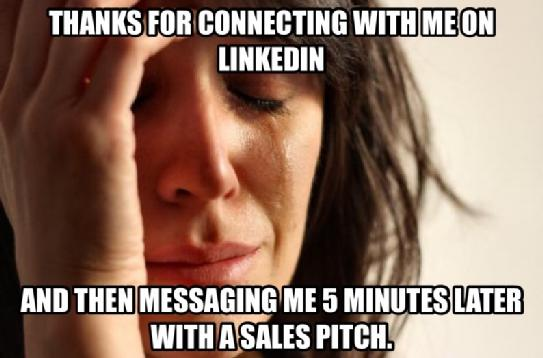When I wrote Psst…! 15 inside tips for sales reps five years ago, I braced for a backlash. But that didn’t happen.
Indeed, I had taken pains to explain that I appreciate the challenges of this line of work, and that I was sharing my insider’s view to engineer a win-win outcome for all of us.
Evidently this was graciously received, as several people contacted me offline to thank me for my frankness. One sales manager even distributed my article to each of his team members for mandatory reading.
But alas, since writing the article I have racked up a number of other bugbears to which sales reps wittingly or unwittingly subject me and, no doubt, other prospective clients.
So if you are a sales rep, please refer to my additional tips below and use them to your advantage. If you are a potential client, please share your own bugbears with me via a comment…
1. Social selling is a different animal.
In this age of social media, I’m flabbergasted by those who use the medium to find me, request a connection, then start pitching. There’s a concept called quid pro quo that’s sorely missing from their repertoire.
I’m active on Twitter and I write this blog, so why not engage with me on these platforms first? If you contribute something substantive, I’ll respect you for it.
I’m also curious as to why such a “big fan” has never ever liked a tweet or contributed a comment.
2. You’re not on the agenda.
I attend conferences to learn. If you want to meet me there, I’d be delighted, but please don’t request a meeting. I prefer to attend the presentations I paid for, and enjoy the breaks in-between.
Do feel free to introduce yourself to me at an opportune moment. That’s networking ;-)
3. No one likes a wolf in sheep’s clothing.
If you ask me to give you feedback on your new widget, don’t repay my courtesy by pressuring me into buying it.
If I help you out by suggesting speakers or topics for your upcoming event, don’t ask me to sell it.
My time and expertise are valuable. I don’t need to spend either on you.
4. The belt-and-braces look is never in fashion.
You are welcome to call me or send me an email – but not both.
It’s really annoying when you leave me a voicemail telling me you’re sending me an email.
5. Your email is not a magic spell.
No, I don’t remember that email you sent last week. I read it, but I get emails from sales reps daily. If I didn’t reply to yours, it’s because I don’t need what you’re offering.
If I do reply saying thanks but no thanks, please don’t insult my intelligence by trying to argue otherwise.
And what’s with the threatening disclaimer? If I “inadvertently” share the content, then I’m a criminal?! That’s no way to treat a potential customer. If your legal department is so afraid of what I might do with your unsolicited message, please don’t send it.
6. Your VIP is my VUP.
Honestly I don’t care if a bigwig from your head office is flying into town. I have my own bigwigs to worry about!
7. We’re not on Dragons’ Den.
I have no interest in “partnering” with you, nor do I seek an opportunity to divulge our strategy to you.
8. If dad says no, don’t ask mum.
Please be aware that my colleagues forward all your emails to me.
9. A cartoon is not a “product tour”.
This one’s more for your marketing department, but it’s good for you to know.
An upbeat animation about your product is a glorified advertisement. I don’t trust advertisements.
In contrast, a product tour shows me your product in action, and provides me with enough information to make a judgement call as to its usefulness and usability.
I won’t sign up for a demo to get this basic info, nor will I contact your sales team. I fear doing so will condemn me to the hard sell.
10. Chickens always come home to roost.
In Australia we have the Goods & Services Tax. By hiding the GST from your quote, you may make your product or service appear cheaper, but I’ll find out the real cost sooner or later.
Then you’ll be as popular as the tax man.



